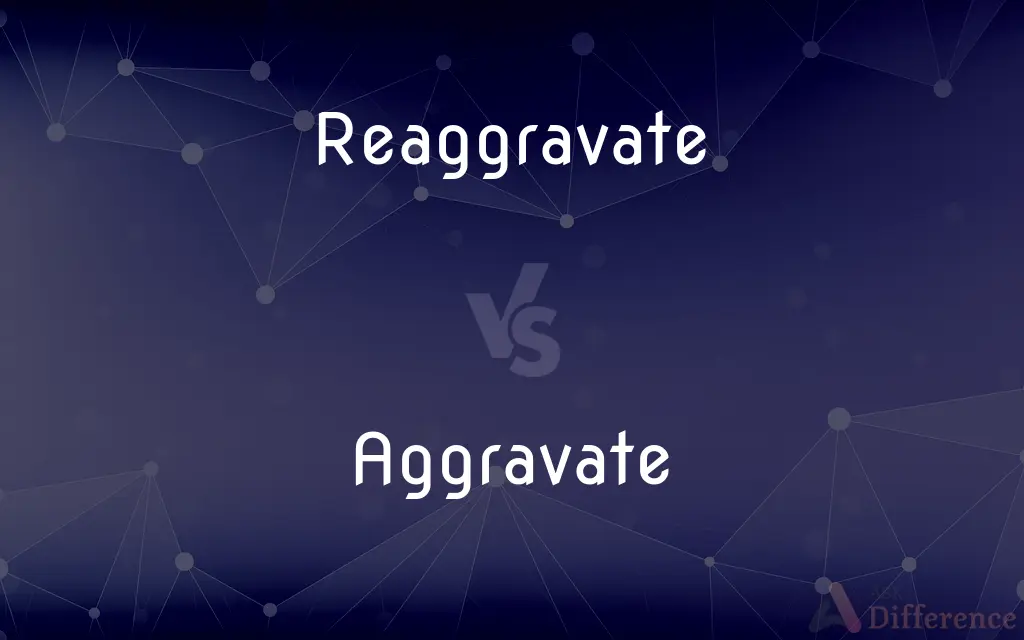Reaggravate vs. Aggravate — What's the Difference?
Edited by Tayyaba Rehman — By Fiza Rafique — Updated on April 28, 2024
"Reaggravate" specifically refers to worsening a condition that had previously improved or stabilized. While "aggravate" means to make a situation worse or more severe.

Difference Between Reaggravate and Aggravate
Table of Contents
ADVERTISEMENT
Key Differences
"Reaggravate" implies a recurrence or a worsening of something that was previously alleviated or healed, typically used in medical or physical contexts. On the other hand, "aggravate" is often used to describe the act of making any condition, situation, or problem worse. This term is broad and can apply to various contexts, from medical to social.
When discussing injuries or health conditions, to "aggravate" means to cause an increase in severity, such as aggravating an injury by continuing strenuous activity. In contrast, to "reaggravate" suggests that the injury had been healing or dormant before it was exacerbated again, usually by a specific action or neglect.
The use of "aggravate" can also extend to emotional or interpersonal scenarios, such as aggravating a dispute by adding more conflict. However, "reaggravate" is almost exclusively used in the context of physical conditions or previously resolved issues that have become problematic again.
Both terms indicate a worsening state, but "reaggravate" carries an additional layer of meaning, suggesting a setback in recovery or management of a condition. This makes it particularly suitable for discussions about recovery processes or the management of chronic conditions.
In practical terms, while both actions are negative, "reaggravate" often has a more disappointing connotation because it implies losing ground in what might have been a progressing improvement, whereas "aggravate" might simply mean a continuation or escalation of an existing issue without prior improvement.
ADVERTISEMENT
Comparison Chart
Definition
Worsen a condition that had previously improved or stabilized.
Make a situation worse or more severe.
Usage Context
Primarily medical or physical.
Medical, social, interpersonal.
Connotation
Worsening after improvement.
General worsening.
Scope of Use
Specific, implying recurrence or setback.
Broad, any worsening condition.
Examples
Reaggravating a healed wound, a resolved issue.
Aggravating an injury, a conflict.
Compare with Definitions
Reaggravate
Cause deterioration in a previously stable condition.
Returning to work too soon may reaggravate your recovery from surgery.
Aggravate
Intensify the negative qualities of.
The harsh weather conditions aggravated the severity of the outage.
Reaggravate
To make a previously improving condition worse again.
He reaggravated his knee injury during the match.
Aggravate
To make a problem or condition worse.
Skipping rehabilitation sessions might aggravate the injury.
Reaggravate
Worsen something that had been under control.
Lifting heavy weights reaggravated her back pain.
Aggravate
Worsen an existing condition.
Certain foods can aggravate allergy symptoms.
Reaggravate
Set back in the healing or management of a condition.
Ignoring doctor's advice led to reaggravating his condition.
Aggravate
Exacerbate a situation or condition.
His lack of honesty aggravated the misunderstanding between them.
Reaggravate
Renewed worsening of an issue.
Insufficient rest can easily reaggravate old injuries.
Aggravate
Increase in seriousness or severity.
The new policy could aggravate unemployment issues in the region.
Reaggravate
To make (a problem, injury, etc.) worse or more serious once again; to aggravate a second or further time.
Aggravate
To make worse or more troublesome
Aggravate political tensions.
Aggravate a medical condition.
Reaggravate
To aggravate again.
Aggravate
To annoy or exasperate
The child's whining aggravated me.
Aggravate
To make (an offence) worse or more severe; to increase in offensiveness or heinousness.
Aggravate
(by extension) To make worse; to exacerbate.
Aggravate
To give extra weight or intensity to; to exaggerate, to magnify.
He aggravated the story.
Aggravate
(obsolete) To pile or heap (something heavy or onerous) on or upon someone.
Aggravate
To exasperate; to provoke or irritate.
Aggravate
To make heavy or heavier; to add to; to increase.
Aggravate
To make worse, or more severe; to render less tolerable or less excusable; to make more offensive; to enhance; to intensify.
To aggravate the horrors of the scene.
The defense made by the prisoner's counsel did rather aggravate than extenuate his crime.
Aggravate
To give coloring to in description; to exaggerate; as, to aggravate circumstances.
Aggravate
To exasperate; to provoke; to irritate.
If both were to aggravate her parents, as my brother and sister do mine.
Aggravate
Make worse;
This drug aggravates the pain
Aggravate
Exasperate or irritate
Common Curiosities
Is "reaggravate" commonly used outside of medical contexts?
While it's primarily used in medical or physical contexts, "reaggravate" can sometimes apply to situations or issues that recur after seeming resolution.
How can one avoid aggravating an existing conflict?
Avoiding aggravation in conflicts often involves maintaining calm, seeking to understand other perspectives, and avoiding escalatory language or actions.
Can emotional stress reaggravate physical conditions?
Yes, emotional stress can reaggravate physical conditions by impacting the body's ability to heal or manage pain effectively.
What steps can be taken to prevent reaggravating an old injury?
Preventing the reaggravation of an old injury typically involves following medical advice, gradual strength training, avoiding overexertion, and properly warming up before activities.
What's the difference in urgency between treating an aggravated vs. reaggravated condition?
Both conditions require timely attention, but a reaggravated condition may be more urgent due to the potential for rapid deterioration or the setback in recovery.
Can changes in weather reaggravate certain health issues?
Yes, changes in weather, such as shifts in temperature or humidity, can reaggravate health issues like arthritis or migraines.
What does it mean to aggravate an injury?
To aggravate an injury means to increase its severity or cause further harm, often due to continued activity or inadequate care.
How do doctors determine if a condition has been aggravated or reaggravated?
Doctors assess changes in symptoms, review patient activity logs, and may use diagnostic tools to determine if a condition has worsened or recurred.
Is there a psychological impact when a condition is reaggravated?
Yes, reaggravating a condition can lead to frustration, disappointment, and anxiety, impacting the psychological well-being of a patient.
What are the implications of frequently reaggravating an injury for long-term health?
Frequently reaggravating an injury can lead to chronic issues, prolonged recovery, and potentially permanent damage or disability.
Share Your Discovery

Previous Comparison
Toffy vs. Toffee
Next Comparison
Alabamian vs. AlabamanAuthor Spotlight
Written by
Fiza RafiqueFiza Rafique is a skilled content writer at AskDifference.com, where she meticulously refines and enhances written pieces. Drawing from her vast editorial expertise, Fiza ensures clarity, accuracy, and precision in every article. Passionate about language, she continually seeks to elevate the quality of content for readers worldwide.
Edited by
Tayyaba RehmanTayyaba Rehman is a distinguished writer, currently serving as a primary contributor to askdifference.com. As a researcher in semantics and etymology, Tayyaba's passion for the complexity of languages and their distinctions has found a perfect home on the platform. Tayyaba delves into the intricacies of language, distinguishing between commonly confused words and phrases, thereby providing clarity for readers worldwide.
















































